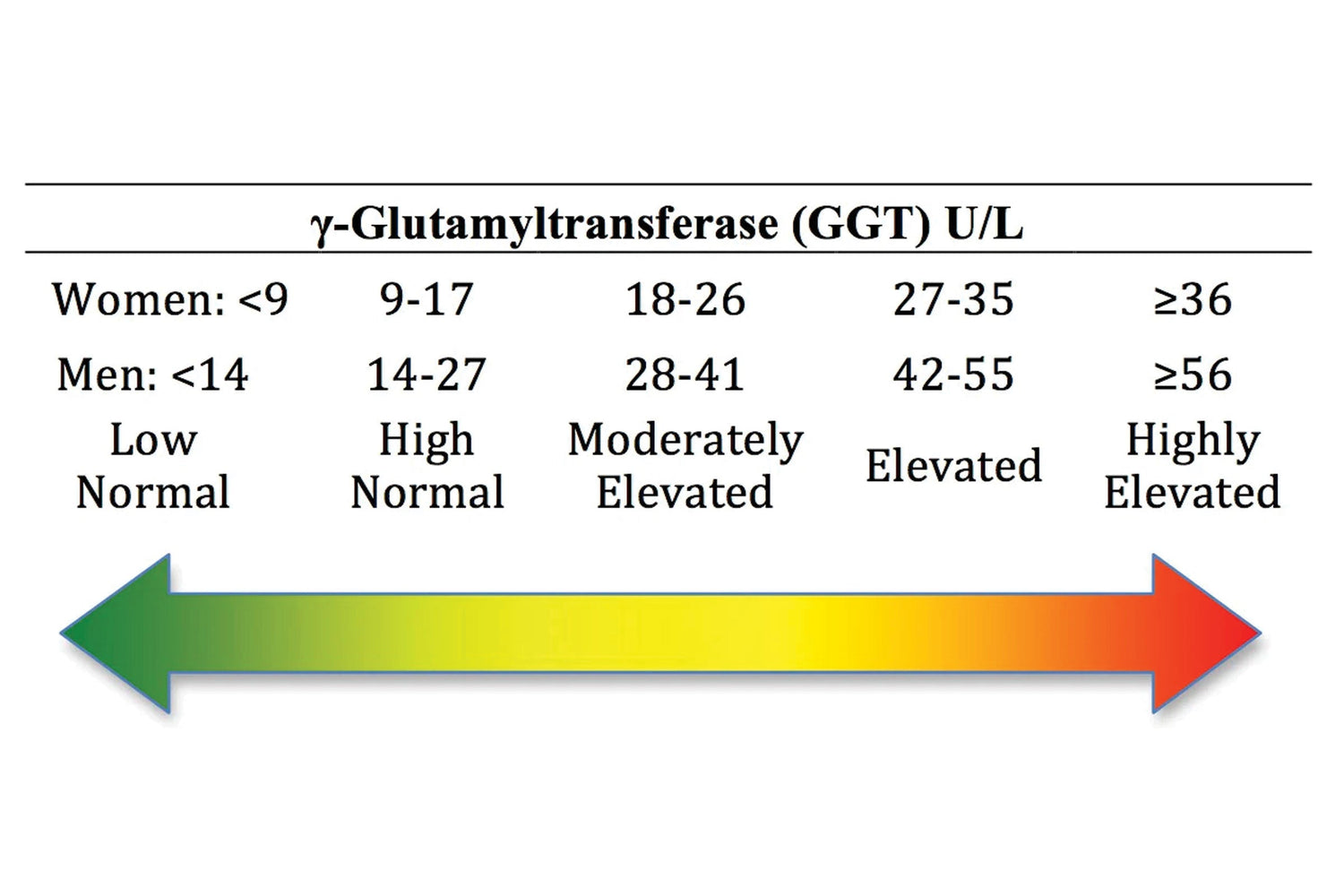Your liver is absolutely amazing. It has regenerative abilities that no other organ has inside of you. If only 30 percent of it was still left, it could regrow its entire structure within months. The liver is so important that common blood tests regularly include 4 liver enzymes, which we wrote about in a previous article. One of the lesser known enzymes is GGT (Gamma-Glutamyl Transferase). As we stated before, GGT levels tell you about more than just your liver health. GGT is a key marker for liver health, detoxification, and even overall longevity. If your GGT levels are high, it’s worth understanding what this means and what you can do about it. Since GGT tells you so much, I thought it was worth doing a whole article just about GGT. So let's dig in.
What Is GGT?
GGT is an enzyme that helps your body process toxins and transport amino acids. It plays a major role in bile production and detoxification. So GGT is a key player in keeping your body clean and functioning well.
What Does a High GGT Level Mean?
When your GGT levels are high, it’s often a sign that your liver is under stress. However, GGT doesn’t just point to liver disease—it can also indicate toxin exposure, alcohol use, or metabolic health issues. Here are some of the most common causes:
- Alcohol Consumption: GGT is highly sensitive to alcohol intake, and it can remain elevated even if you only drink occasionally.
- Non-Alcoholic Fatty Liver Disease (NAFLD): If you don’t drink much but your GGT is high, fatty liver disease from poor diet, obesity, or insulin resistance could be the cause.
- Toxin and Medication Exposure: Certain drugs, including acetaminophen, NSAIDs, statins, and some antibiotics, as well as environmental toxins like pesticides, heavy metals, and air pollutants, can raise GGT levels. Even processed foods with artificial additives and preservatives may contribute to liver stress.
- Bile Duct Problems: If GGT is elevated along with ALP (alkaline phosphatase), it may signal bile flow issues, such as gallstones or liver congestion.
- Oxidative Stress & Inflammation: Elevated GGT is linked to increased oxidative stress and chronic inflammation, both of which contribute to conditions like heart disease, diabetes, and liver damage. Chronic inflammation can make it harder for the liver to function properly, leading to further elevation in GGT levels and increased health risks over time, which plays a role in aging, heart disease, and diabetes.
Is GGT Related to Longevity?
Yes! Research shows that higher GGT levels are associated with increased mortality risk, even in people without obvious liver disease. One study (source) found that GGT, even within normal physiologic levels, was associated with increased deaths from any cause, heart attack deaths, and might also be linked to cancer-related deaths in the general population. This is because GGT reflects oxidative stress and overall toxin burden, which can contribute to heart disease, diabetes, and early aging.
What Is a Healthy GGT Level?
Even levels that are in the "normal" range indicate elevated risk of disease. Risk of disease is a continuum, not a black and white "yes" and "no" switch. I made a graphic that illustrates this, based on data from this source.

The levels are slightly lower for women than men.
- Optimal Range: Under 14 U/L for men and under 9 U/L for women. Keep doing what you are doing, as it is working well.
- Moderate Risk: 28-48 U/L for men and 18-26 U/L for women—the lab test will likely say "normal", but research shows that even slightly elevated GGT levels indicate a shorter lifespan in your future.
- High Risk: > 56 U/L for men and > 36 U/L for women—this elevated level is an all-hands-on-deck fire alarm saying you should have already taken action yesterday to lower your risk of prematurely dying from diabetes, heart disease or cancer. Keep reading to see what to do next.
How to Lower GGT and Support Liver Health
If your GGT is elevated, here’s what you can do:
- Reduce Alcohol Intake – Even moderate drinking can raise GGT. Cutting back can bring levels down within weeks. Your habit is seriously damaging your liver and it is not keeping up.
- Support Detox Pathways – Eat cruciferous vegetables (broccoli, Brussels sprouts, kale) and foods rich in sulfur (garlic, onions) to boost detoxification.
- Increase Glutathione (Your Master Antioxidant) – Take N-Acetyl Cysteine (NAC), selenium, or alpha-lipoic acid (ALA) to replenish glutathione. Our Glutathione Promoter product contains all 3 of these, plus zinc and vitamin E.
- Boost Your Level of Physical Activity – Physical activity improves liver function and reduces oxidative stress. Your body was made to move, so find activities that require movement that you enjoy.
- Eat a Liver-Friendly Diet – Prioritize whole foods, healthy fats, and avoid processed sugars and seed oils. The Hallelujah Diet is very liver friendly.
- Stay Hydrated – Water helps flush out toxins and supports liver function.
- Avoid Unnecessary Medications & Toxins – Over-the-counter pain relievers, processed foods, and environmental toxins all add to your liver’s workload. Wean yourself off of these things by replacing them with natural pain relievers (curcumin, DMSO/MSM, serrapeptase, etc.), whole foods, and cleaning products without strong fragrances and chemicals.
Final Thoughts
GGT is more than just a liver enzyme—it’s a powerful marker of detoxification, oxidative stress, and longevity. If your levels are high, take it as a sign that your liver (and overall health) needs some extra attention. The good news? By making principled, meaningful changes, even small steps to start with, you can lower your GGT levels and improve your chances of a long, healthy life. Don't be like George Burns who said, after smoking cigars his whole life, "If I had known I was going to live this long, I would have taken better care of myself."
Want to take control of your health? Start by checking out your daily habits and see which one thing you could change this week to get you moving in the right direction towards a healthy you!






